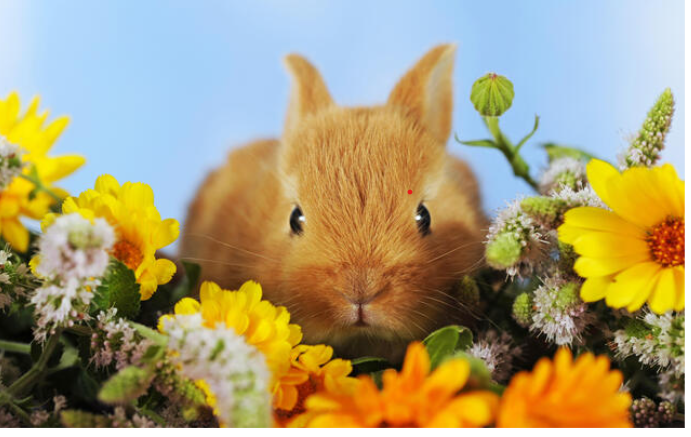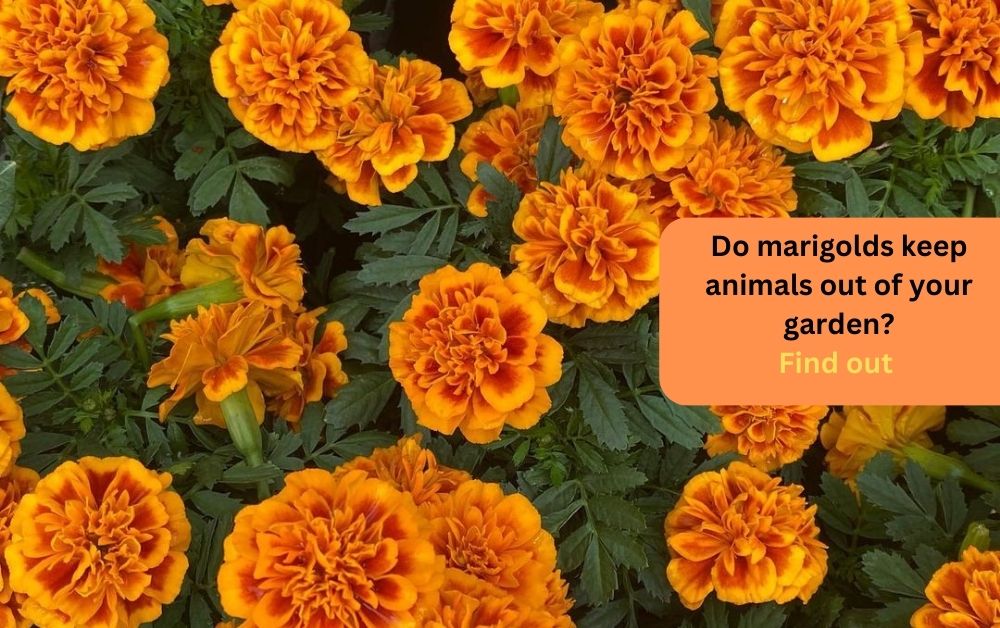Do marigolds keep animals out of your garden? If you’ve ever battled with pesky pests, from rabbits munching on your prized vegetables to deer making nightly visits to your flowerbeds, you’re likely on a quest to find an effective and eco-friendly solution. Well, you’re in for a blooming good surprise because marigolds might just be the garden warriors you’ve been looking for!
Gardeners, both seasoned and newcomers, have long sung praises about the marvels of marigolds. These vibrant, sun-kissed flowers don’t just add a splash of color to your garden – they serve as formidable sentinels, standing guard against a range of animal intruders.
But how do these seemingly innocent blooms accomplish this remarkable feat? The answer lies in the intricate chemistry of marigolds. These flowers are equipped with a secret weapon: natural compounds like pyrethrum that act as powerful insect repellents.
Picture a garden where marigolds stand tall, releasing their protective aroma and displaying their vivid blossoms. Animals, whether they’re furry, feathered, or crawling, are met with an olfactory forcefield that makes your garden uninviting.
In this article, we’ll delve deep into the science behind marigolds’ pest-repelling powers. We’ll explore the specific animals and insects that marigolds deter, and we’ll provide you with practical tips on how to harness the full potential of these floral guardians. So, if you’re ready to discover the magic of marigolds and bid farewell to unwanted garden visitors, let’s get started!
About Marigolds and Why Plant Them
Marigolds, with their vibrant colors and distinctive aroma, are not just pretty garden adornments. They are, in fact, one of the most popular and versatile flowers you can plant in your garden. But why are marigolds planted in the garden, you might wonder? Well, let me shed some light on the multifaceted role marigolds play in the world of gardening.
- Natural Pest Repellent: Marigolds are renowned for their ability to repel a wide range of garden pests. Their roots release substances that deter nematodes, and microscopic worms that can damage plant roots. Additionally, the strong scent of marigold foliage acts as a natural deterrent for insects like aphids and whiteflies. By planting marigolds strategically, you can reduce the need for chemical pesticides and protect your garden in an eco-friendly way.
- Companion Plants: Marigolds are excellent companions for many vegetables and herbs. They have a protective effect on neighboring plants, shielding them from pests. For example, planting marigolds alongside tomatoes can help prevent tomato hornworm infestations. Their companionship promotes healthier growth for both marigolds and the plants they protect.
- Soil Improvement: These hardy flowers are not overly picky about soil conditions. They can thrive in various types of soil, but they particularly excel in poor or compacted soils. Marigold roots break up compacted earth, improving soil aeration and drainage. They also add organic matter as they decompose, enriching the soil over time.
- Continuous Blooms: Marigolds are known for their prolific and long-lasting blooms. Whether you choose the traditional orange and yellow varieties or the more exotic ones, marigolds provide color and visual interest throughout the gardening season. Their vibrant flowers are a source of joy for gardeners and a natural magnet for pollinators like bees and butterflies.
- Edible and Medicinal Uses: Some marigold varieties, like calendula (pot marigold), are edible and have culinary and medicinal uses. Calendula petals can be used in salads, and teas, and as a natural remedy for various skin conditions, such as minor cuts and burns.
Marigolds are much more than just ornamental flowers. They are a gardener’s secret weapon, offering protection, companionship, soil improvement, beauty, and even practical uses.
So, the next time you see marigolds gracing a garden, know that they are not merely decorative; they are essential contributors to the garden’s health and vitality.

Do marigolds keep animals out of your Garden?
Marigolds do have some pest-repelling properties, particularly against insects like aphids and nematodes. While they may not serve as an absolute barrier, they can act as a deterrent. Marigolds release natural compounds, such as pyrethrum, which can discourage certain pests like aphids and nematodes.
The strong scent of marigold foliage can also make the garden less inviting to some animals like rabbits and deer. While the strong scent of marigolds may deter some animals, it may not be sufficient to prevent determined garden intruders.
Gardeners often use marigolds in combination with other pest control methods and deterrents to create a more comprehensive strategy for keeping animals out of their gardens. Fencing, repellent sprays, and companion planting are examples of additional measures that can be employed alongside marigolds to protect the garden from a wider range of animal threats.
So, while marigolds can be a valuable part of your garden’s pest management plan, they may not provide complete protection against all animals. It’s essential to consider the specific animal pests you’re dealing with and employ a holistic approach to garden defense.
Ways to Keep animals away from your garden
Keeping animals like rabbits or deer away from your garden can be a challenge, but there are several effective methods you can employ to protect your plants and crops. Here are some tried-and-true ways to deter these garden-invading critters:
- Fencing: Install a sturdy fence around your garden. For rabbits, a fence that’s at least 2 feet high should suffice, but for deer, a taller fence (around 7-8 feet) is necessary. Make sure the fence goes at least 6 inches below ground to deter burrowing.
- Motion-Activated Sprinklers: Invest in motion-activated sprinkler systems that spray water when animals approach. The sudden burst of water startles them and keeps them away.
- Repellents: Use animal repellents, either commercially available or homemade, to deter animals. These can include scented deterrents, like predator urine, or taste-based repellents that make your plants less appealing.
- Companion Planting: Plant companion plants that animals find unattractive near your vulnerable crops. For example, deer tend to avoid plants like garlic and onions.
- Physical Barriers: Protect individual plants with physical barriers like wire cages or cloches. This is especially useful for young or vulnerable plants.
- Pruning and Trimming: Keep vegetation near the garden area well-pruned and trimmed. This removes potential hiding spots for animals and makes it less attractive as a habitat.
- Ultrasonic Devices: Ultrasonic animal-repellent devices emit high-frequency sounds that are unpleasant for animals but generally undetectable to humans. These devices can deter a range of garden pests.
- Netting and Row Covers: Cover your plants with netting or row covers to prevent animals from accessing them. This is particularly effective for protecting berries and other fruit-bearing plants.
- Scare Tactics: Employ scare tactics like scarecrows, reflective tape, or noise-making devices to startle animals when they approach your garden.
- Regular Monitoring: Keep a close eye on your garden and inspect it regularly for signs of animal activity. The sooner you detect a problem, the easier it is to address it.
- Alternate Food Sources: Provide alternative food sources for animals away from your garden. This can include setting up feeding stations with items they prefer.
- Dog or Human Presence: Animals are less likely to venture near a garden when they sense the presence of dogs or humans. Regularly walking your dog in the garden area or spending time there yourself can act as a deterrent.
Remember that no single method may work in all situations, so it’s often best to use a combination of these strategies to effectively deter rabbits, deer, and other garden intruders.
Additionally, local wildlife habits and preferences can vary, so it’s essential to adapt your approach based on your specific circumstances.
Conclusion
In conclusion, protecting your garden from animals like rabbits and deer requires a thoughtful and multifaceted approach. While marigolds and other natural deterrents can play a role in safeguarding your plants, it’s important to recognize that no single method is foolproof. These creatures can be determined and adaptable, so a combination of strategies is often necessary for success.
Fencing remains one of the most effective methods for keeping animals out of your garden, with height and durability tailored to the specific threat. Repellents, both commercial and homemade, can be valuable allies, but consistent application is key. Companion planting and careful garden design can help create an environment less appealing to garden invaders.
Scare tactics, physical barriers, scent deterrents, and regular garden maintenance all contribute to your garden’s defense. Choosing plant varieties that are less attractive to animals is another savvy move.
Remember, the effectiveness of these methods can vary depending on local wildlife behavior and preferences, so it’s important to observe and adapt your approach as needed. Gardening in harmony with nature requires patience and persistence, but with the right strategies in place, you can enjoy a flourishing garden while minimizing the impact of animal visitors.
